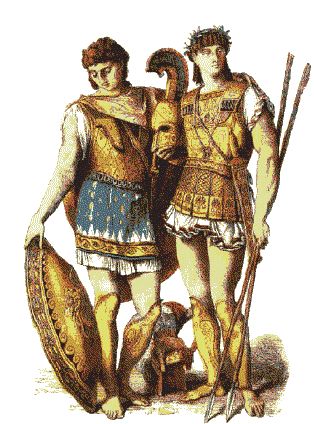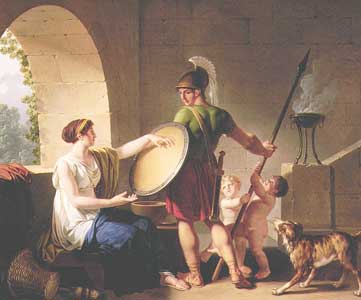Ancient Greek Spartans was a very different kind of city-state when compared to the rest of the city-states. The ancient Greek Spartans were basically descendants of the Dorians. The life of the citizens of Sparta was a particularly strict one which was similar to the military.
The young boys would be taken away from their homes at an extremely early age to start their training with the military. The young girls were also forced to stay healthy so that they could produce children who were healthy.
Ancient Sparta Location
Ancient Sparta was located in the southeastern portion of the Peloponnese, a region known as Laconia. It was situated just on the banks of the Euphrates river which was the main source of water for them.
It was mainly a mountainous region, surrounded by Mt. Permanent, Mt. Taygetus, and the Arcadian highland which provided them natural protection against its enemies. It had no direct outlet to the sea and was completely dependent on land routes for communication. The hard topography directly affected the nature of Spartans, which made them rough and quite warlike without any natural bounties bestowed upon them

Ancient Greek Spartan Social system
The ancient Greek Spartans had three types of classes in the entire society. The first was the upper class. This class consisted of the people who had a voice to project and their opinions would also be heard. The lower class which was known as the perioeci which meant neighbors was ones who weren’t complete members of the society. They were well off because of the economies of trade.
The Spartan society was divided between its free military elite and the slaves or helots. The society was led by two kings and its counseling body of elders. It was followed by the military elite or hoplites who lived their lives in army barracks. The bottom of the society was represented by the huge slave population, who worked their lands and gave a certain portion to the Spartan state. They did not have any rights and were at the mercy of the free spartan citizens

The slaves also known as the Helots who were basically used as slaves for the upper class. These Hamlets were actually seen as the enemy even though they were simply slaves. Like the other city-states, the Greek population was a really big problem for ancient Greek Spartans.
The other city-states would found daughter cities and they would try and eradicate the problem but then Sparta had decided to go for a different approach. During their first Messenian war, Sparta had gained fertile land and lots of Hamlets.
Ancient Greek education
The Spartan system was quite different from the other Greek system of education, especially from Athenians. Their main aim was to develop physical and military skills, and getting to be a part of the Spartan phalanx was considered to be the ultimate goal. Their education schools were similar to a Military boot camp which was referred to as Agoge.
Intellectual activities like reading and writing were kept to a minimum as they believed it led to softening of the citizens which could lead to degeneration of the spartan ways.
The spartan males began training in this from the age of 7 when they were removed from their families to live in the barracks. They stayed here under strict discipline and practiced extreme physical training up to the age of 12. Living in this was hard to acquaint with hardships and stealing was encouraged.
Along with physical training, teamwork and bonding were stressed. They were taught to fight as a unit rather than as an individual, and they were acquainted with all the military tactics of the famed Spartan army. After graduating they were known as Ephebe and were expected to join fighting groups and continue their physical training until the age of 22 when they were included in the Spartan army.
The Spartan women also received formal education in contrast to other Greek states where girls were forbidden in educational spaces. They received physical training and learned to run, wrestle, throw discus and javelins. Apart from physical training they also learned to sing, dance and play instruments. They were often trained to become future mothers and become strong to build another strong future Spartan soldier.

Spartan children
They had a peculiar ceremony of drowning their children in wine to test their strength as the ones who cried were abandoned to die or made into slaves. They started training their children at the age of 7. They took boys to barracks at that age and would not be allowed to leave until he was 30 years old.
Even girls were given education in weaponry as even women were expected if required. They were prepared to direct slaves as agriculture was a field overseen by the women with the help of the slaves in Sparta.
The children were left in extremely tough conditions and treated harshly to make them tough. They were encouraged to steal but on being caught, they would be whipped without mercy.
Ancient Sparta culture
The spartan lived a life full of martial values. They discouraged luxury which they thought made people soft and promoted frugality. A huge reason for these cultural traits is the tough topography of the area which was quite mountainous and the soil was not fertile making them warlike.
So Sparta was a state which mainly values Martial and warrior values, without a place for aesthetics. It had a great brotherhood among its free citizens, which was extremely important for their cohesive battle formatio
Ancient Sparta political system
Sparta was a landlocked state and did not have any access to the sea without any scope for trade. Their land routes were also quite hilly making communications and especially trade extremely difficult. So they grew up to hate trade and its commercial nature.
Its economy was mostly based on agriculture. But in spite of an agricultural economy their lands being hilly were not fertile. So they mostly had their wealth from conquered areas. They are considered to be the most powerful military force of ancient Greece and had conquered many lands for their resources and especially Messenia which was the main economic strength of Sparta.
It was only after the capture of Messenia that Sparta became quite powerful. Messenia was one of the most fertile lands of Greece and was mainly farmed by its helot population which was controlled by the sistren state making it the backbone of the economy.
Despite their power and prestige, they could never reach the economic productivity of Athens. They led a frugal way of life without many places for luxuries. War and military were extremely important for their survival due to the lack of natural resources in Sparta.
Ancient Spartan Army
The Spartan Hoplite army was known as the best military of ancient Greece, and it was mandatory for all adult male citizens. While most of ancient Greece had seasonal armies with farmers coming to battles in the non harvesting season while going back for the harvest, in Sparta, all the farming was done by the slaves and this allowed them to keep the only standing army in ancient Greece.
They prepared all of their adult male population to be good soldiers. Their education also focused mostly on war and how to fight with very minimal attention to other subjects.
Battle of Hysiae
In the battle of Hysiae against Argos, Sparta was defeated and the Hamlets had revolted which had resulted in another war in Messiaen and the Spartans were able to suppress the revolt. After this Greek Military and war, Sparta had isolated itself from the rest of the Greek city-states.
Even though this city-state had managed to become quite powerful the number of Spartans was quite small. The foreign military actions were completely avoided and suspicion would start to arise from anything which was foreign. The social life of the ancient Greek Spartans had changed completely as the city-state had turned into a military state.

Boys who were as young as six had to go to military school. In the end, Sparta managed to become the leader o the Peloponnese in an attempt to save the dwindling population. This was carried out by a military pact which accepted the support of each other as well as smaller cities.
Persian Wars
Sparta joined the other Greek states to stop the invasion of Xerxes. Their heroic stand in the battle of Thermapylae in which with just 300 Spartan soldiers they managed to delay a huge Persian army for some time which turned the tide of the war, increasing the morale of the Greek states. They even led the Greek forces in their resistance to the Persians and managed to defeat them with the battle of Salamis.
Peloponnesian War and Decline
After the Greco-Persian wars, Sparta became involved in a deadly Peloponnesian war with Athens along with their allies and had to fight a destructive 27 years war and managed to defeat the Athenian army with the help of the Persians. The war led Sparta to become the most powerful state in Ancient Greece.
But their ascendancy wasn’t for long as they were soon defeated in the Corinthian war. These wars had weakened them considerably and also faced a dwindling population, which also led to many helot revolts. The twin blows of external and internal forces made them extremely vulnerable and ultimately were captured by the Macedonians under Philip which ended their freedom.